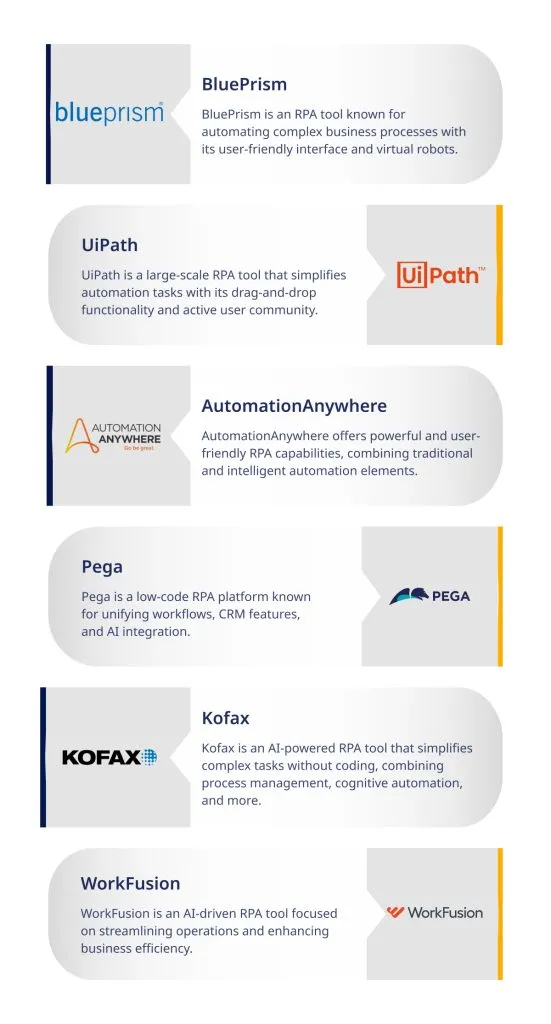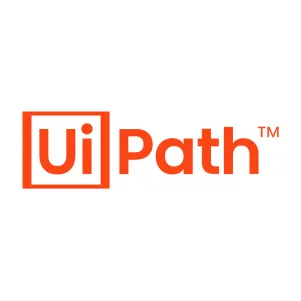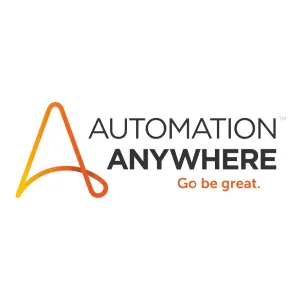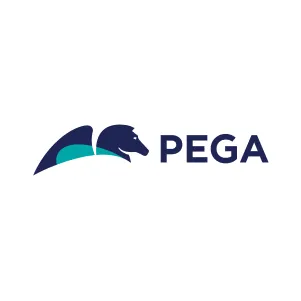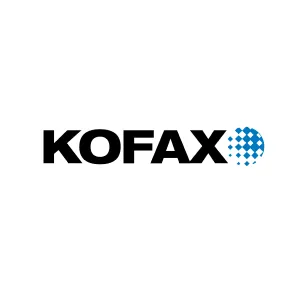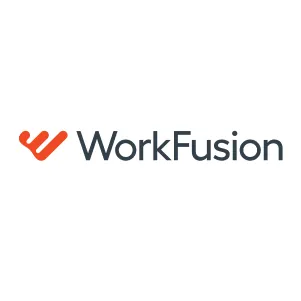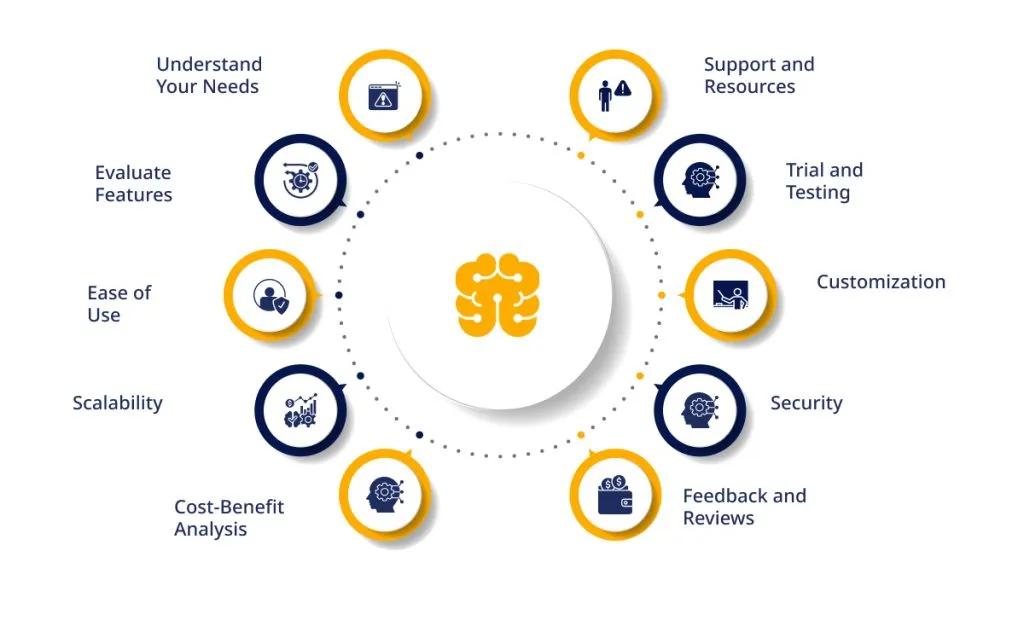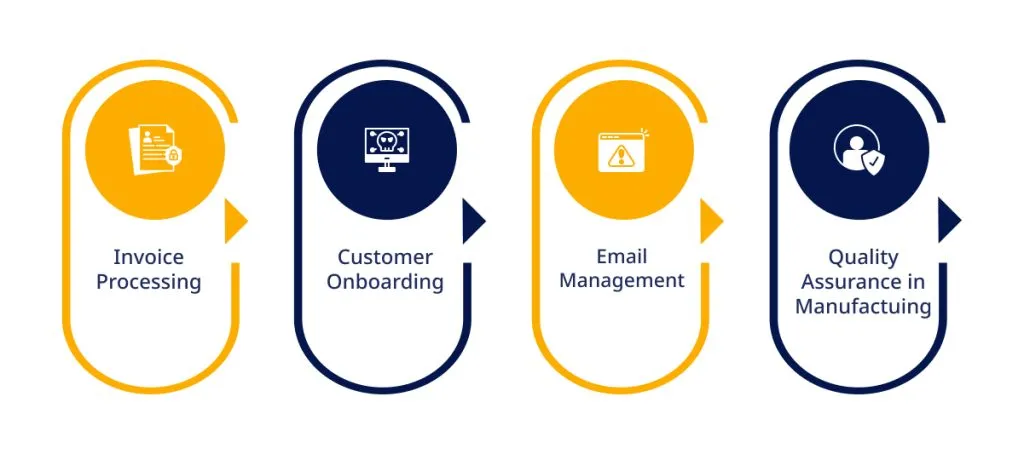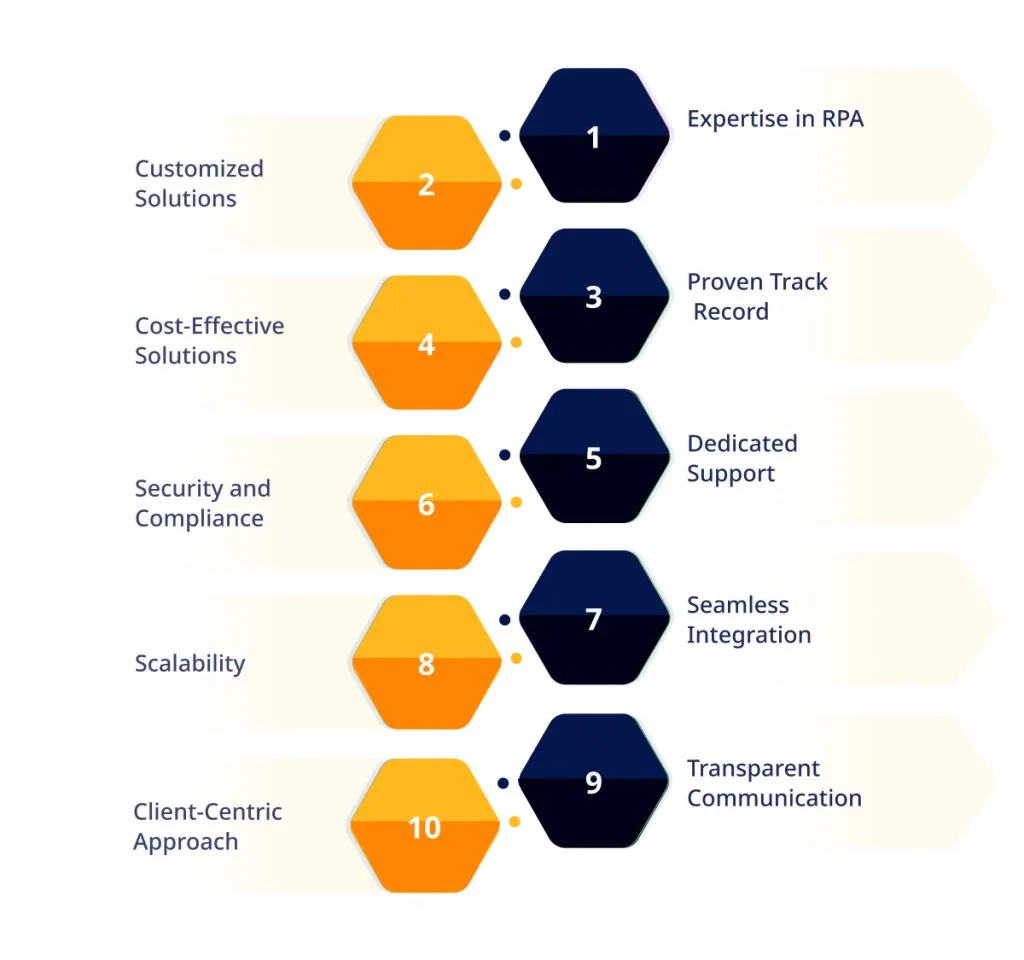Are you ready to embark on a journey into the future of automation, where innovation and efficiency reign supreme? As businesses worldwide seek to streamline operations and boost productivity, Robotic Process Automation (RPA) emerges as the game-changer.
In 2025 and beyond, the automation landscape is evolving rapidly, with leading RPA tools poised to dominate. From the precision of BluePrism to the user-friendliness of UiPath, we’ll delve into the features, pros, and cons of each, helping you navigate the automation terrain.
Join us as we unravel the key to success in the automation era and guide you in selecting the perfect RPA tool for your needs.
Understanding RPA
Robotic Process Automation (RPA) might sound like a complex term, but at its core, it’s all about making your life easier and your business more efficient.
Imagine having a helpful robot at your side that stays energized, makes mistakes, or complains. That’s essentially what RPA is – a digital assistant that handles repetitive, rule-based tasks.
Here’s how it works: When you hire RPA developers, they design software to mimic human actions on a computer. It can click buttons, copy and paste data, fill in forms, and even send emails like you do.
But it does it faster and without getting bored. You teach the RPA software how to do these tasks by showing it the steps, and then it can do them on its own, 24/7.
Why is this a big deal? Well, it frees up your time and employees’ time from mundane jobs, allowing you to focus on more important things. RPA can work with various software systems without costly integrations, making it versatile and cost-effective. Plus, it reduces errors, improves accuracy, and can even help you save money in the long run.
In a world where time is money, RPA is a valuable ally and future of automation for companies looking to remain competitive and efficient. It’s like having a supercharged workforce that never sleeps.
Join us on the path to automation success!
The Leading RPA Tools in 2025 and Beyond
In a world increasingly reliant on automation, businesses seek the perfect Robotic Process Automation (RPA) tools to improve efficiency and reap the benefits. In 2025, several RPA tools are poised to dominate the landscape, and here are the top ones you need to know:
BluePrism
BluePrism stands out as a reliable RPA tool for the future of automation, capable of automating complex and end-to-end business processes. It operates using virtual robots based on the user-friendly Java Programming language. Even if you’re new to RPA, BluePrism’s visual designer and drag-and-drop technology make it accessible.
Features of BluePrism
- Secure and accurate automation of unlimited processes.
- Robust features like load balancing, end-to-end auditing, and data encryption.
- Scalability through central management and monitoring.
- Streamlined session monitoring with dashboard configuration.
- Autonomous robots with intelligent capabilities.
Pros of BluePrism
- High-quality end-to-end auditing
- Exceptional precision and accuracy
- Scalable for diverse tasks
- 24/7 operation with high accuracy
Cons of BluePrism
- Limited OCR functionality
- Challenges with the application modeler for novices
- Editing objects during debugging can be tricky
UiPath
UiPath is a trusted and user-friendly RPA tool for the future of automation, suitable for large-scale automation projects. Its drag-and-drop functionality simplifies automation, including tasks involving Windows desktop automation. With a vibrant community offering support, UiPath is a powerful choice.
Features of UiPath
- Visual workflows with a drag-and-drop interface
- Recording and playback for repetitive activities
- A wide range of predefined activity sets
- Seamless data scraping from various sources
- Strong security standards
Pros of UiPath
- Speed, accessibility, and agility for productivity
- Cost-efficient 24/7 operation
- Enhanced data monitoring and reporting
- Centralized management with analytics
Cons of UiPath
- Limited features in the Orchestrator community edition
- Challenges with activating libraries from the nugget package
- Limited cognitive computing capabilities
Unleash Automation's Full Potential with ValueCoders
AutomationAnywhere
AutomationAnywhere is a globally recognized RPA tool for the future of automation, known for its powerful and user-friendly interface. It combines traditional and intelligent RPA elements, including machine learning and NLP, to automate complex tasks.
Features of AutomationAnywhere
- SMART automation for complex tasks
- Agile Auto-Calibration technology
- Embedded AI capabilities
- Machine learning for data extraction and classification
- Bot management in on-premise or cloud bot control rooms
Pros of AutomationAnywhere
- Increased scalability and flexibility
- Scriptless automation for non-coders
- Enhanced automation with IQ bot
- Access to prebuilt bots from BotStore
Cons of AutomationAnywhere
- Challenges with customization by non-developers
- Limitations in the community edition
- Device and bot usage restrictions in the community edition
Pega
Pega is a standout RPA tool for the future of automation, recognized for its low-code approach, unifying workflows, and process automation capabilities. Its adaptive cloud architecture allows for rapid deployment and meets strategic business needs. Pega boasts award-winning CRM features, digital process automation, AI integration, and RPA capabilities, making it a leading choice for many businesses.
Features of Pega
- Robust support for object-level integration with enterprise applications, legacy, and custom systems.
- Design-once-and-deploy-anywhere model for versatile interfacing.
- Pega Live-Data for comprehensive data management and delivery.
- Caching options for flexible data changes.
- Customizable business processes with the Pega situational layer cake.
Pros of Pega
- Accelerated application development for quick business conversions
- Easy migration between data center and cloud environments
- Seamless user experience transition across devices
- Integrated form design tools and web-based process customization
Cons of Pega
- Higher costs, particularly for small-scale companies
- Integration challenges with non-relational databases
- Limited access to resources for community edition users
Discover Your Perfect RPA Solution with ValueCoders
Kofax
Kofax is an AI-powered RPA tool for the future of automation, offering an extensive range of next-gen capabilities. It simplifies complex automation tasks without requiring APIs, scripting, or coding. Kofax combines business process management, process mining, cognitive document automation, and robotic process automation, making it a comprehensive solution for information-intensive processes.
Features of Kofax
- Unified robot designer with a rich library of reusable process snippets
- Centralized server for robot management
- Automated process discovery and RPA analytics
- Cognitive Document Automation with AI and machine learning
- Creation of Kaplets for lightweight web-based business applications
Pros of Kofax
- Increased productivity, operational efficiency, and cost savings
- Versatile task automation with intelligent robots
- SOAP, REST, Java, or .NET API endpoints for publishing robots
- Version Control System for easy robot management
Cons of Kofax
- Complexity, especially for non-coders
- Limited online resources for cognitive and AI capabilities
- Frequent and fast-paced updates are challenging to keep up with
WorkFusion
WorkFusion is another contender in the RPA landscape for the future of automation, known for its AI-driven automation capabilities. It focuses on streamlining operations and enhancing business efficiency through intelligent automation solutions.
Features of WorkFusion
- AI-driven automation for enhanced efficiency
- Data extraction and processing with machine learning
- Process orchestration for end-to-end automation
- Real-time analytics and insights
- Integration with various data sources and systems
Pros of WorkFusion
- Improved efficiency through AI-powered automation
- Precise data extraction and processing
- Comprehensive process automation
- Real-time insights for informed decision-making
Cons of WorkFusion
- Complexity in AI-driven automation
- Limited resources for certain features
- Ongoing learning curve for some users
In the rapidly evolving landscape and future of automation, these RPA tools offer diverse capabilities to suit the specific needs of businesses.
Now that you know about the tools, are you curious to know about how to choose the ideal one for you? You can go through our ultimate guide to using automation tools in software development.
Also Read: The Ultimate Guide To Using Automation Tools In Software Development
Choosing the Right RPA Tool For the Future of Automation
In the ever-expanding realm of supply chain automation solutions, selecting the right Robotic Process Automation (RPA) tool is a pivotal decision that can shape the future of your business. With several options at your disposal, how do you make the best choice? Let’s break it down in straightforward terms.
Understand Your Needs: Before diving into RPA tool options, thoroughly assess your automation needs. What specific tasks or processes do you want to automate? Are they routine and rule-based, requiring minimal human decision-making?
Having a clear understanding of your automation requirements is the first step.
- Evaluate Features: Different RPA tools offer various features and capabilities. Consider what features are essential for your business. For instance, if you require high security, look for tools with robust encryption and authentication features. If scalability is vital, opt for tools that can easily handle increased workloads.
- Ease of Use: User-friendliness is critical, especially if your team lacks prior RPA experience. Look for RPA tools with intuitive interfaces, drag-and-drop functionality, and comprehensive documentation. A strong user community can also be valuable for troubleshooting and learning.
- Scalability: Think long-term. Your business needs may grow, and your RPA tool should grow with you. Scalability ensures the tool remains effective and efficient as your automation requirements expand.
Optimize Efficiency with ValueCoders' Expertise
- Cost-Benefit Analysis: While RPA can lead to cost savings in the long run, it’s essential to consider the full cost picture. Calculate the initial investment, licensing fees, ongoing maintenance costs, and potential return on investment. Ensure that the benefits outweigh the expenses.
- Support and Resources: Check the availability of support and resources provided by the RPA tool. A responsive customer support team, detailed documentation, and an active user community can be invaluable when encountering challenges or having questions.
- Trial and Testing: Take advantage of trial versions or automated testing services environments offered by RPA tool providers. This allows you to assess how well the tool aligns with your specific processes and workflows. It’s an opportunity to see if it suits your needs before committing.
- Customization: Consider your ability to customize the RPA tool to your unique requirements. Customization can be vital if your processes are highly specialized or you want to tailor the tool to match your workflow seamlessly.
- Security: Prioritize security, especially if your automation involves handling sensitive data or if your industry has strict compliance requirements. Ensure that the RPA tool complies with data protection and security industry standards.
- Feedback and Reviews: Research user feedback and read reviews from other organizations using the RPA tool. Real-world experiences provide insights into the tool’s performance, reliability, and any potential issues you might encounter.
- Future-Proofing: Consider the tool’s adaptability and potential longevity. Will it remain relevant and effective as automation technology evolves beyond the current year? Ensuring the tool can grow and adapt to the changing automation landscape is crucial.
By thoroughly exploring these factors and aligning them with your business objectives, you can confidently select an RPA tool that not only meets your current needs but also positions your organization for success in the ever-evolving world of automation.
In this world of globalization, one thing that cannot be ignored is the importance of localization in mobile application testing services.
Also Read: The Importance Of Localization In Mobile App Testing
Use Cases of RPA
Robotic Process Automation (RPA) is like a digital assistant that performs repetitive tasks precisely and quickly. Here are some practical and easy-to-understand use cases where RPA shines:
Invoice Processing:
RPA is used to streamline business invoice processing. When invoices are received, an RPA development company, using software, can automatically scan and extract crucial information like invoice number, date, and amount. This data is entered into the company’s accounting or Enterprise Resource Planning (ERP) system.
Automotive software development companies, for example, can leverage RPA for tasks like order processing, data entry, and documentation management, helping to reduce errors and accelerate processes. This allows the automotive sector to focus more on critical, innovation-driven activities.
Additionally, RPA can validate invoices by cross-referencing them with purchase orders and payment terms, reducing errors and ensuring timely payments. This use case significantly speeds up the accounts payable process and minimizes the need for manual data entry.
Customer Onboarding:
RPA simplifies and expedites customer onboarding, especially in the banking and finance sectors. When a new customer applies for services, RPA can assist in form completion, document verification, and identity checks.
It can automatically validate information against external databases and perform credit checks. This not only accelerates the onboarding process but also enhances security and compliance by ensuring accurate customer information.
Email Management:
RPA can be employed to manage emails efficiently. It can categorize incoming emails, filter out spam, and prioritize messages based on predefined rules. RPA can also draft and send automated responses to common inquiries or route emails to the appropriate departments or individuals.
This use case helps organizations handle high email volumes more effectively, ensuring important messages are addressed promptly while reducing the burden on human staff.
Quality Assurance in Manufacturing:
RPA is crucial in quality assurance within manufacturing processes. Robots equipped with RPA technology can inspect products on assembly lines for defects or irregularities. They use cameras and sensors to identify issues and take corrective actions, such as rejecting or diverting faulty items.
This not only ensures consistent product quality but also reduces the need for manual inspections, thereby improving efficiency and reducing production costs.
These are just a few examples of how RPA can be applied across various industries to save time, reduce errors, and improve efficiency. As automation technology advances, the potential for RPA to enhance business processes is limitless.
You can also read our well-explained guide to power automation and its use cases for in-depth clarification from mundane to automation.
Also Read – How AI in Business Process Automation is Changing the Game
Selecting The Best RPA Development Company
Choosing a leading RPA development company is crucial in your automation journey. Among the many options, ValueCoders stands out as a trusted partner to help you harness the power of Robotic Process Automation (RPA).
Why ValueCoders for RPA Development?
- Expertise in RPA: ValueCoders boasts a team of skilled developers well-versed in RPA technologies. We understand the nuances of automation and can tailor solutions to meet your specific needs.
- Customized Solutions: We believe in the power of customization. Our RPA solutions are designed to align seamlessly with your business processes, ensuring maximum efficiency and ROI.
- Proven Track Record: With years of experience, we have successfully delivered RPA projects across various industries. Our track record speaks of our commitment to excellence and client satisfaction.
- Cost-Effective Solutions: At ValueCoders, we understand the importance of cost efficiency. We are a powerful and cost-effective RPA development company in India, allowing you to maximize your automation benefits without breaking the bank.
- Dedicated Support: Your automation journey doesn’t end with implementation. We deliver dedicated support and maintenance services to ensure your RPA solutions continue to perform optimally.
- Security and Compliance: The security of your data and compliance with industry regulations is our top priority. Our RPA solutions are built with robust security measures to safeguard your information.
- Seamless Integration: ValueCoders ensures RPA integrates smoothly with your existing systems and processes. We minimize disruption and ensure a seamless transition to automated workflows.
Partner with ValueCoders for RPA Excellence
- Scalability: As your business grows, your automation needs may evolve. Our RPA solutions are designed with scalability, allowing you to adapt to changing requirements effortlessly.
- Transparent Communication: We believe in transparent communication. Throughout the development process, you’ll have clear insights into the progress of your RPA project, ensuring that your vision becomes a reality.
- Client-Centric Approach: Your success is our success. ValueCoders is committed to a client-centric approach, focusing on delivering RPA solutions that drive tangible business outcomes and exceed your expectations.
When you choose ValueCoders as your RPA development company, you’re not just getting a service provider but gaining a trusted ally in your automation journey. Our expertise, commitment, and client-focused approach make us the best choice for your RPA development needs.
Contact us today to explore how ValueCoders can help you harness the full potential of Robotic Process Automation for your business. Your future of automation begins here.



